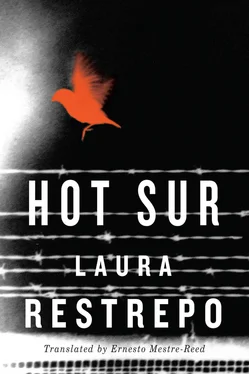The next picture is a difficult one, because the angel is holding a sponge. Very strange, a sponge, something so common and removed from the sublime. What harm can you do with a sponge? Aside from tickling someone under the armpits with it, Rose couldn’t think of anything. “Read, idiot,” he told himself. The inscription says it all. Portaverunt me aceto , they gave me vinegar. How methodical of Edith, how precise, everything translated perfectly. “I see, I see,” Rose said. “The anguished Christ was thirsty and must have asked for water, and they gave him vinegar. Gross. Twisted, like they say. They dunked that sponge in vinegar and burned his lips with it, scorched his throat and laughed at him. Bad, bad, bad angel. You deserve a spanking, and as punishment you will be known as Sponge Bob.” Of course, Edith believed something else, as always, going against the current. At the bottom of the picture Edith had written Posca , a term Rose had never heard, but which Edith thankfully defined, “Posca, a popular drink in ancient Rome, a blend of water, vinegar, and aromatic herbs.” Can this be true? Could some charitable being have dunked the sponge in posca and reached it up on a stick to the parched mouth of the dying man? “Fine, Edith, we’ll call this angel Posca. Sponge Posca.” But this didn’t end there, something else. “That’s not you in the picture, Edith. Who is that standing at the foot of Posca but me, Ian Rose, wearing a T-shirt that bears the face of James Dean, a very clear impression of that famous face? However, the face of the angel has been cut off. You decapitated Posca with the Canon AE-1. It doesn’t matter. Decapitated angel, you will no longer be known as Sponge Bob or Posca; you have some luck. You will from here on be known as James Dean.”
“Picture after picture, and my fever kept rising,” Rose tells me, “as if my brain were on fire. Look, I’m a simple person; I don’t know anything about these altered states. But that night I was flying. And at the same time, everything seemed so real, I mean the angels, Edith, Edith’s absence, Cleve, Cleve’s death, his murderer, the shadow of his murderer, myself, Rome, the Catskills, they all took on the same kind of harsh reality, the same intensity, everything existed equally and at the same time, the fever brought everything together before my eyes, within reach.”
Next was the angel Rose most feared, the one he had been waiting for, the one that truly anguished him, the one holding the crown of thorns. This is Cleve’s angel, Rose thought, and shuddered. He found the inscription appalling: Dum configitur spina, as the thorns stab. Edith, not knowing that one day her son would suffer the thorns; Edith, not even knowing that one day she would have a son, noted that this angel enjoyed the privilege of being sculpted by Bernini himself, who left the creation of the other angels to his apprentices. “Thank you for the clarification, Edith,” Rose said. “You were always so studious.” This angel ensnared Rose like none of the other ones; he couldn’t stop looking at it, or maybe the other way around, the thing couldn’t stop looking at him. It is a terrible angel, Rose realized. “Cleve, my son, what kind of a father am I who was not there to protect you from this assault?” This was also the most anguished of all the angels. Bernini had made it easy to perceive the trapped scream behind his parted lips. That, and the threatening torment in the depth of its eyes, made it into a macabre figure. “You will be called Thorn,” Rose said with an unfathomable rage and scribbled the name various times, Thorn, Thorn, Thorn, stabbed the angel with the name, scratched it and scratched it and scratched it until the only thing visible in the picture were the scratches. The bridge had disappeared, leaving behind only scratches. The Tiber had disappeared — Rome, the angel, the crown, and above all Edith, all disappeared. All that was left were scratches from top to bottom; Rose had stabbed Thorn with a million sharp scratches, with thorns, that is.
The following page revealed an almost feminine figure gently holding up a cloth: Respice facie, look at the face. “What should I call this angel?” Rose asked himself, less frenzied, less aggressive, catching his breath. “Facies, of course. That’s what you will be called, look how I delicately write your new name in a corner of the picture.” This is the angel holding Veronica’s cloth, the handkerchief on which the face of Jesus remained engraved when the woman named Veronica went to wipe away the blood and sweat. But Edith’s note made something very clear: it was enough just to consider the etymology of the name to realize that this Veronica had never existed, that she was no more than Vero Icon, the true image of Christ engraved in Veronica’s cloth, that is, the cloth of the true icon. “Damn, Edith, you are a smart one!” But that wasn’t all with this angel either; on the contrary, things were just getting started. One: with a rag or a piece of cloth, someone cleans the face of a man. Two: the face of the man remains impressed there, like in a photograph. A face. The face. A face on a rag. On a rag? A red rag? John Eagles, the dog-food deliveryman, with his face ripped off and stuck to a rag? Did this finally explain the mysterious murder of John Eagles? But John Eagles had nothing to do with Sleepy Joe, didn’t know him, had never crossed him. Or had he?
Rose was exhausted, his overheated brain could not go on and demanded some rest, but he wasn’t done, the task not completed, one more angel remaining. The last angel in the album holds in one hand the tunic that they ripped off Christ before crucifying him and in the other hand the dice with which the Roman soldiers gambled for it among themselves. Miserunt sortem, they tried their luck. Fucking centurions, gambling for God’s clothes. “You will be called Alea,” Rose said. The whole scene has never really made any sense to Rose. The Robe , a movie Rose saw as a teenager, played up the incongruity by changing the coarse tunic for a more presentable, obviously expensive purple cloth, and Richard Burton, the lucky centurion who won at dice, walked away satisfied wearing the flamboyant robe. But you don’t have to be Richard Burton to know that purple is the imperial color, exclusive and sumptuous. That’s all well and good. But to gamble for a pitiful cloth woven by a poor artisan from Galilee, and then be dragged up the mountain, torn by stones and whipping, a thing of misery, all muddy and stained? It made no sense. But for Rose, it couldn’t matter now. No point getting lost in theological debates; that’s not what’s important. What mattered was to tie up loose ends, put two and two together, follow the scent. The scales tilted toward Maraya, Sleepy Joe’s other mistress. Rose, drunken with revelations, consulted María Paz’s manuscript. He wanted to find out what María Paz had said about Maraya, the table dancer at Chikki Charmers, who was boiled in a hot tub till the flesh fell off her bones; poor Maraya, who as a corpse had a die placed on each of her eyes while her friends fought over her clothes, a victim of the mania and obsessiveness of Sleepy Joe, a miserable fuck with some strange fixations. Too obvious, Rose thought. All this was all too easy. “Disgusting,” he muttered, and he felt his bile rise against the murderer so predictable in all his shit. “Motherfucker, Sleepy Joe,” Rose grumbled, “your shoddy puzzles are straight out of Paulo Coelho and Dan Brown, some shoddy mystic, how disgustingly you follow the pattern to the letter, that’s your bravery, your audacity, you kill with the instruments of the Passion of Christ, one after another, rising up those bloody steps. That’s your great invention. But you’re just a routine murderer at the end of the day.”
Читать дальше












